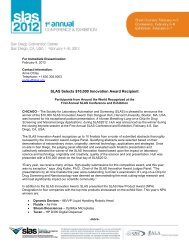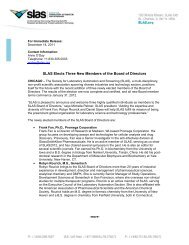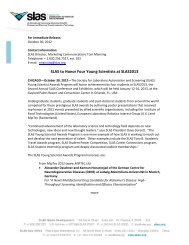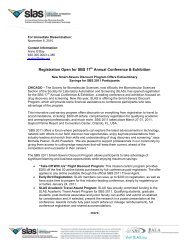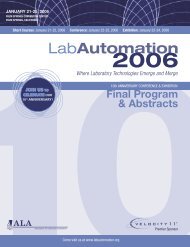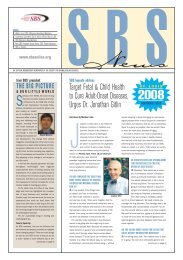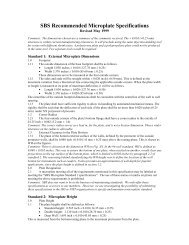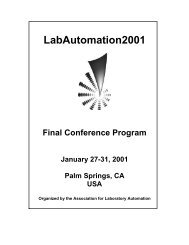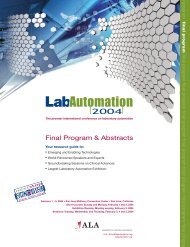- Page 1:
The premier international conferenc
- Page 4 and 5:
UNRESTRICTED SPONSORS Unrestricted
- Page 6 and 7:
CONFERENCE CHAIRS David Herold, M.D
- Page 8 and 9:
ALA COMMITTEES Audit Committee E. K
- Page 10 and 11:
GENERAL INFORMATION CONFERENCE LOCA
- Page 12 and 13:
Association for Laboratory Automati
- Page 14 and 15:
PLENARY PROGRAM OVERVIEW Keynote Pl
- Page 16 and 17:
CONFERENCE AT A GLANCE 8:30 am - 4:
- Page 18 and 19:
PROGRAM Sunday, February 1, 2004 8:
- Page 20 and 21:
5:00 - 6:30 pm Reception in the San
- Page 22 and 23:
Wednesday, February 4, 2004 (contin
- Page 24 and 25:
Thursday, February 5, 2004 (continu
- Page 26 and 27:
Thursday, February 5, 2004 (continu
- Page 28 and 29:
NOTES 26
- Page 30 and 31:
TP014 A Novel System for Automated
- Page 32 and 33:
TP040 Mass Production of Plastic Ch
- Page 34 and 35:
TP067 Neurons as Sensors: Mixed Che
- Page 36 and 37:
These posters should be put up on W
- Page 38 and 39:
WP026 Fully-Automated, High Through
- Page 40 and 41:
WP054 Innovations in Photonics for
- Page 42 and 43:
WP083 Development of an Automated H
- Page 44 and 45:
NOTES 42
- Page 46 and 47:
10:30 am Tuesday, February 3 Plenar
- Page 48 and 49:
4:00 pm Tuesday, February 3 HT Chem
- Page 50 and 51:
9:00 am Wednesday, February 4 HT Ch
- Page 52 and 53:
11:30 am Wednesday, February 4 HT C
- Page 54 and 55:
4:30 pm Wednesday, February 4 HT Ch
- Page 56 and 57:
9:00 am Thursday, February 5 HT Che
- Page 58 and 59:
11:30 am Thursday, February 5 High
- Page 60 and 61:
3:00 pm Thursday, February 5 Discov
- Page 62 and 63:
4:30 pm Tuesday, February 3 High Th
- Page 64 and 65:
9:30 am Wednesday, February 4 High
- Page 66 and 67:
12:00 pm Wednesday, February 4 High
- Page 68 and 69:
5:00 pm Wednesday, February 4 High
- Page 70 and 71: 9:30 am Thursday, February 5 High T
- Page 72 and 73: 4:30 pm Tuesday, February 3 Microfl
- Page 74 and 75: 9:30 am Wednesday, February 4 Micro
- Page 76 and 77: 12:00 pm Wednesday, February 4 Micr
- Page 78 and 79: 5:00 pm Wednesday, February 4 Micro
- Page 80 and 81: 9:30 am Thursday, February 5 Microc
- Page 82 and 83: 1:30 pm Thursday, February 5 Microf
- Page 84 and 85: 3:00 pm Tuesday, February 3 Proteom
- Page 86 and 87: 8:00 am Wednesday, February 4 Prote
- Page 88 and 89: 10:30 am Wednesday, February 4 Prot
- Page 90 and 91: 3:30 pm Wednesday, February 4 Prote
- Page 92 and 93: 8:00 am Thursday, February 5 Proteo
- Page 94 and 95: 10:30 am Thursday, February 5 Prote
- Page 96 and 97: 2:00 pm Thursday, February 5 Automa
- Page 98 and 99: 3:30 pm Tuesday, February 3 Genomic
- Page 100 and 101: 8:30 am Wednesday, February 4 Genom
- Page 102 and 103: 11:00 am Wednesday, February 4 Geno
- Page 104 and 105: 4:00 pm Wednesday, February 4 Genom
- Page 106 and 107: 8:30 am Thursday, February 5 Genomi
- Page 108 and 109: 11:00 am Thursday, February 5 Genom
- Page 110 and 111: 3:00 pm Tuesday, February 3 Clinica
- Page 112 and 113: 8:00 am Wednesday, February 4 Clini
- Page 114 and 115: 10:30 am Wednesday, February 4 Clin
- Page 116 and 117: 3:30 pm Wednesday, February 4 Clini
- Page 118 and 119: 8:00 am Thursday, February 5 Clinic
- Page 122 and 123: 2:00 pm Thursday, February 5 Clinic
- Page 124 and 125: 3:00 pm Tuesday, February 3 Emergin
- Page 126 and 127: 8:00 am Wednesday, February 4 Emerg
- Page 128 and 129: 9:00 am Wednesday, February 4 Emerg
- Page 130 and 131: 10:30 am Wednesday, February 4 Emer
- Page 132 and 133: 11:30 am Wednesday, February 4 Emer
- Page 134 and 135: 3:30 pm Wednesday, February 4 Emerg
- Page 136 and 137: 4:30 pm Wednesday, February 4 Emerg
- Page 138 and 139: 8:00 am Thursday, February 5 Emergi
- Page 140 and 141: 9:00 am Thursday, February 5 Emergi
- Page 142 and 143: 11:30 am Thursday, February 5 Emerg
- Page 144 and 145: 2:30 pm Thursday, February 5 Emergi
- Page 146 and 147: NOTES 144
- Page 148 and 149: TP001 Thor Anders Aarhaug SINTEF Ma
- Page 150 and 151: TP005 Alex Berhitu Spark Holland, I
- Page 152 and 153: TP009 Stefan Betz Kendro Laboratory
- Page 154 and 155: TP013 Christine Brideau Merck Fross
- Page 156 and 157: TP017 Madhu Prakash Chatrathi New M
- Page 158 and 159: TP021 Cristopher Cowan Promega Corp
- Page 160 and 161: TP025 James Dixon North Carolina St
- Page 162 and 163: TP029 Wayne Duncan Agilent Technolo
- Page 164 and 165: TP033 Xingwang Fang Ambion, Inc. Re
- Page 166 and 167: TP037 Alice Gao Corning Incorporate
- Page 168 and 169: TP041 Joseph Granchelli NalgeNunc I
- Page 170 and 171:
TP045 Jennifer Halcome Eppendorf-5
- Page 172 and 173:
TP049 Darren Hillegonds Lawrence Li
- Page 174 and 175:
TP052 Dawn Marie Jacobson Veterans
- Page 176 and 177:
TP056 Joseph Machamer Molecular Dev
- Page 178 and 179:
TP060 Gwendolyn M. Motz The Univers
- Page 180 and 181:
TP064 Dominik Poetz National Instit
- Page 182 and 183:
TP068 Kirby Reed Gilson, Inc. Appli
- Page 184 and 185:
TP072 Burkhard Schaefer National In
- Page 186 and 187:
TP076 Duraisamy Sridharan Anna Univ
- Page 188 and 189:
TP080 Sarah Tao Boston University B
- Page 190 and 191:
TP084 Hayley Wu Caliper Technologie
- Page 192 and 193:
TP088 Jaskiran Kaur Orochem Technol
- Page 194 and 195:
WP001 Chris Barbagallo Millipore Co
- Page 196 and 197:
WP005 Carole Crittenden Molecular D
- Page 198 and 199:
WP009 Marcy Engelstein Millipore Co
- Page 200 and 201:
WP013 Günther Knebel Greiner Bio-O
- Page 202 and 203:
WP017 Lynn Jordan Zymark Corporatio
- Page 204 and 205:
WP021 Dan Kephart Promega Corporati
- Page 206 and 207:
WP025 Duane Kubischta DOE Joint Gen
- Page 208 and 209:
WP030 Kurt Lund ACESystems, Inc. 13
- Page 210 and 211:
WP034 Ruth H. Myers Aurora Instrume
- Page 212 and 213:
WP038 Laura Pajak Beckman Coulter,
- Page 214 and 215:
WP042 Chad Pittman Beckman Coulter,
- Page 216 and 217:
WP046 Lynn Rasmussen SAIC: NCI Fred
- Page 218 and 219:
WP050 Steve Richmond Genetix Ltd R&
- Page 220 and 221:
WP055 Donald Schwartz DRD 83 Pine S
- Page 222 and 223:
WP058 Michael Simonian Beckman Coul
- Page 224 and 225:
WP062 Norbert Stoll University of R
- Page 226 and 227:
WP066 Yu Suen Beckman Coulter, Inc.
- Page 228 and 229:
WP070 Melissa Trout Code Refinery 2
- Page 230 and 231:
WP074 Sofia Vikstrom PerkinElmer Li
- Page 232 and 233:
WP078 Mike Wheeler Guy’s and St.
- Page 234 and 235:
WP082 Hayley Wu Caliper Technologie
- Page 236 and 237:
WP086 Ruth Zhang Beckman Coulter, I
- Page 238 and 239:
NOTES 236
- Page 240 and 241:
Tuesday, February 3, 2004 The Autom
- Page 242 and 243:
Tecan Workshop Lunch 1 12:00 - 1:30
- Page 244 and 245:
Wednesday, February 4, 2004 Beckman
- Page 246 and 247:
TekCel Workshop Lunch 2 12:30 - 2:0
- Page 248 and 249:
EXHIBITOR LISTING 3M Bioanalytical
- Page 250 and 251:
Featuring the World’s Largest Exh
- Page 252 and 253:
Adhesives Research, Inc. 400 Seaks
- Page 254 and 255:
Applied Robotics, Inc. 648 Saratoga
- Page 256 and 257:
Big Bear Automation Pleasanton, Cal
- Page 258 and 259:
Brandel 8561 Atlas Drive Gaithersbu
- Page 260 and 261:
deCODE genetics 7869 NE Day Road W.
- Page 262 and 263:
E&K Scientific Products 1085 Floren
- Page 264 and 265:
General Data Company, Inc. 4354 Fer
- Page 266 and 267:
GenoVision Inc. 901 South Bolmar St
- Page 268 and 269:
ILS Innovative Labor Systeme Mittel
- Page 270 and 271:
Kloehn Company 10000 Banburry Cross
- Page 272 and 273:
270
- Page 274 and 275:
MDL Information Systems 14600 Catal
- Page 276 and 277:
Modern Drug Discovery/ Chemical & E
- Page 278 and 279:
276
- Page 280 and 281:
Orochem Technologies, Inc. 762 Burr
- Page 282 and 283:
PharmaGenomics Magazine 485 Route 1
- Page 284 and 285:
RAPP POLYMERE GmbH Ernst Simon Str.
- Page 286 and 287:
SAGE Publications 2455 Teller Road
- Page 288 and 289:
Silex Microsystems AB Box 595 Brutt
- Page 290 and 291:
Spark Holland, Inc. 666 Plainsboro
- Page 292 and 293:
Tecan/Tecan Systems, Inc. 4022 Stir
- Page 294 and 295:
Tomtec 1000 Sherman Avenue Hamden,
- Page 296 and 297:
Waters Corporation 34 Maple Street
- Page 298 and 299:
NOTES 296
- Page 300 and 301:
Sunday, February 1, 2004 Barcode Te
- Page 302 and 303:
Sunday, February 1, 2004 Microarray
- Page 304 and 305:
Monday, February 2, 2004 Mass Spect
- Page 306 and 307:
NOTES 304
- Page 308 and 309:
Brounstein, Kevin 78 Brown, Cliffor
- Page 310 and 311:
Gubler, Hanspeter 20, 65 Guggenheim
- Page 312 and 313:
Masui, Colin 36, 207 MATECH 271 Mat
- Page 314 and 315:
Schultz, Henry 24, 142 Schulz, Step
- Page 316 and 317:
Zimmermann, Juergen 40, 234 Zimmerm
- Page 318 and 319:
Bench-level scientist? Or all-star
- Page 320 and 321:
NOTES 318
- Page 322:
A v i s i o n a r y n e w e v e n t




